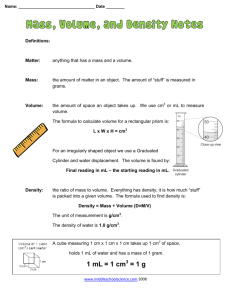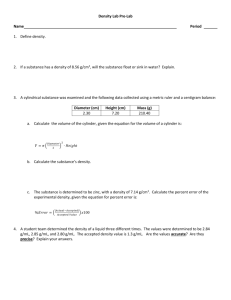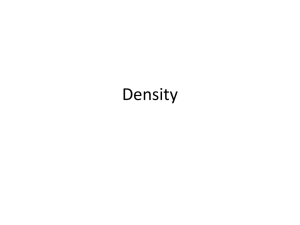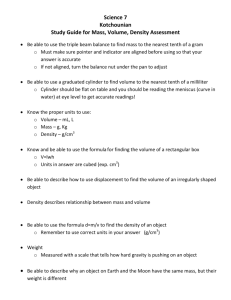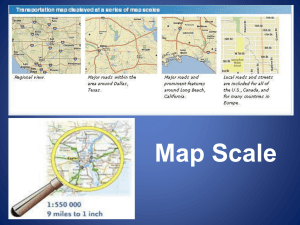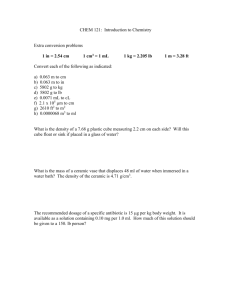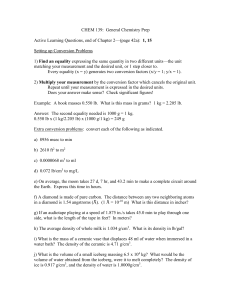Volume - Gore High School
advertisement
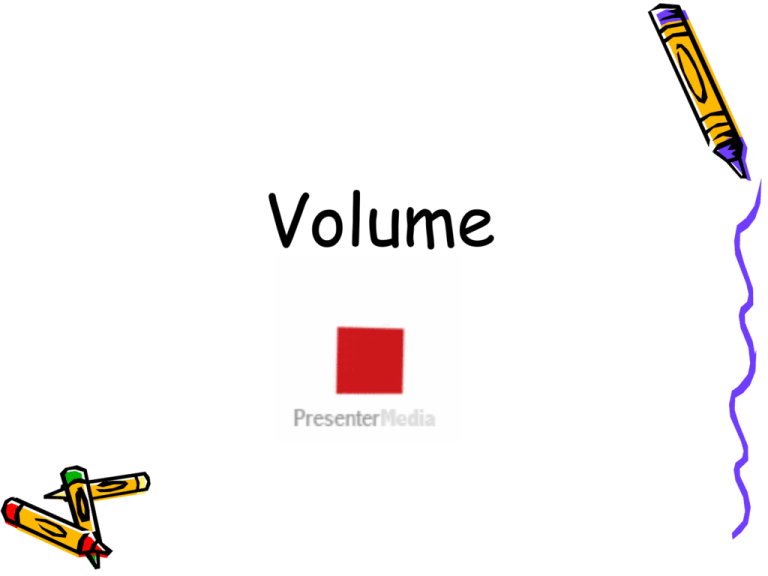
Volume Volume Volume is the amount of space occupied by any 3-dimensional (3D) object. The units for volume are… mm3, cm3, m3 and km3 Units of Volume When we measure volume we find how many cubes it would take to fill a space. 1mm 1mm 1mm = 1 mm3 (1 millimetre cubed) 1cm 1cm 1cm = 1 cm3 (1 centimetre cubed) 1m = 1 m3 (1 metre cubed) 1m 1m Volume by Counting If each cube measures 1 cm3 find the Volume 6 cm3 1cm 1cm 1cm If each cube measures 1 cm3 find the Volume 1cm 1cm 1cm 12 3 cm If each cube measures 1 cm3 find the Volume 1cm 1cm 1cm 32 3 cm If each cube measures 1 cm3 find the Volume 1cm 1cm 1cm 27 3 cm If each cube measures 1 cm3 find the Volume 1cm 1cm 1cm 15 3 cm Volume of Cuboids using a formula What is a Cuboid? Top Side 2 Back Front Bottom Side 1 Height (H) Width (W) Length (L) A 3D rectangle Volume Volume of a Cuboid All this counting will take a long 3 row you a quicker waylayer. to 4time. rowsCan of 5 5cm cm33see =in20cm each in each find the volume? 4 cm 3 40 cm 60 cm3 5 cm Volume = 5 x 4 x 3 = 60 cm3 3cm Volume of Cuboid Formula It takes far too long to count cubes so lets use a formula… Volume = Length x Width x Height h l w V=lxwxh http://www.youtu be.com/watch?v= TxAi3J_LlzA (still stuck?: go to above link) Find the volume of this cuboid This cuboid measures 2cm by 2cm by 3cm so the volume is … V = 2 x 2 x 3 = 12cm3 Check by counting Find the volume of this cuboid This cuboid measures 4cm by 4cm by 2cm so the volume is … V=4x4x2= 32 3 cm Check by counting Find the following Volumes 4 mm 36 mm3 Volume = 2 cm x 7 cm x 6 cm = 84 cm3 84 cm3 7 cm 4m 36 mm3 3 mm 3 mm 2 cm Volume = 4 mm x 3 mm x 3 mm = 36 mm3 84 cm3 6 cm Volume = 9 m x 4 m x 6 m = 216 m3 216 m3 216 m3 6m 9m What is a Cube? Square Side Square Top Square Back Square Side Square Front Square Bottom Length (L) Length (L) Length (L) A 3D square Volume of a Cube Formula L L L • Volume = Length x Length x Length =LxLxL = L3 If the length of each cube measures 1 cm find the Volume 1cm Volume = 2 x 2 x 2 = 1cm 1cm Find the volume of the following cuboids. 4 cm 1 Volume = 4 x 4 x 4 = 64 cm3 Volume = 5 x 5 x 5 = 125 cm3 3 2 3m 5m Volume = 3 x 3 x 3 = 27 m3 Time for a silly song. http://www.youtube.com/watch?v=A2WsSHf96sQ Prisms SLO: Know the names of the parts of 3D shapes Edge Face Vertex What is a Prism? Cylinder Cuboid What do they all Uniform section have incross common? Trapezoid Prism Triangular Prism http://www.youtube.com/watch?v=gSJtOUgFS-0 (what is a prism video) Which of the following shapes are prisms? Volume of Prism Formula Volume of Prism = Cross-sectional area x length Length Your Turn: Volume of Prism Area = 10 cm2 8 cm Volume = Cross Sectional Area x Length = 10 x 8 = 80 cm3 http://www.youtube.com/watch?v= 6nJgDehGmI4 (video to find volume of any prism) Your Turn: Volume Cuboid Cross-sectional Area = b x h =7x5 = 35 cm2 5cm 10cm 7cm Volume = Cross Section Area x Length = 35 x 10 = 350 3 cm Your Turn: Volume Triangular Prism Cross-sectional Area = ½ x b x h =½x8x4 = 16 cm2 4cm 4.9cm 10cm 8cm Volume = Cross Section Area x Length = 16 x 10 = 160 cm3 http://www.khanacademy.org/math/geometry/basicgeometry/v/solid-geometry-volume (Khan: how to find volume of triangular prism) Your Turn: Volume Cylinder Cross-sectional Area = π x r2 3cm = π x 32 = 27cm2 (I have used π = 3) 5cm Volume = Cross Section Area x Length = 27 x 5 = 135 cm3 (Liquid volume) (fluid ounce) cup (pint) millilitre litre (quart) (gallon) http://www.youtube.com/watch?v=WmLi9ydZmA (video: what is capacity) Comparing ml, L and 1 ml 1cm 1cm = 1 ml (1 cm3 = 1 ml) 1cm 1 Litre 10 cm 10 cm 10 cm 3 cm = 1 litre (1000 cm3 = 1L) Converting between cm3 and Litres Divide by 1000 Move the number 3 places to the right when dividing by 1000. Litre 3 cm Multiply by 1000 Move the number 3 places to the left when multiplying by 1000. E.g. Fill in the table below cm3 Litre 1) 2000 2 2) 4000 4 3) 5780 5.78 4) 540 0.54 Extension Activity http://www.youtube.com/watch?v=eGVi37wFeZU Thanks This power point has been put together using power points, images, videos and games from the net. Thank you to all those who have placed their work in the public domain. For others to use.
